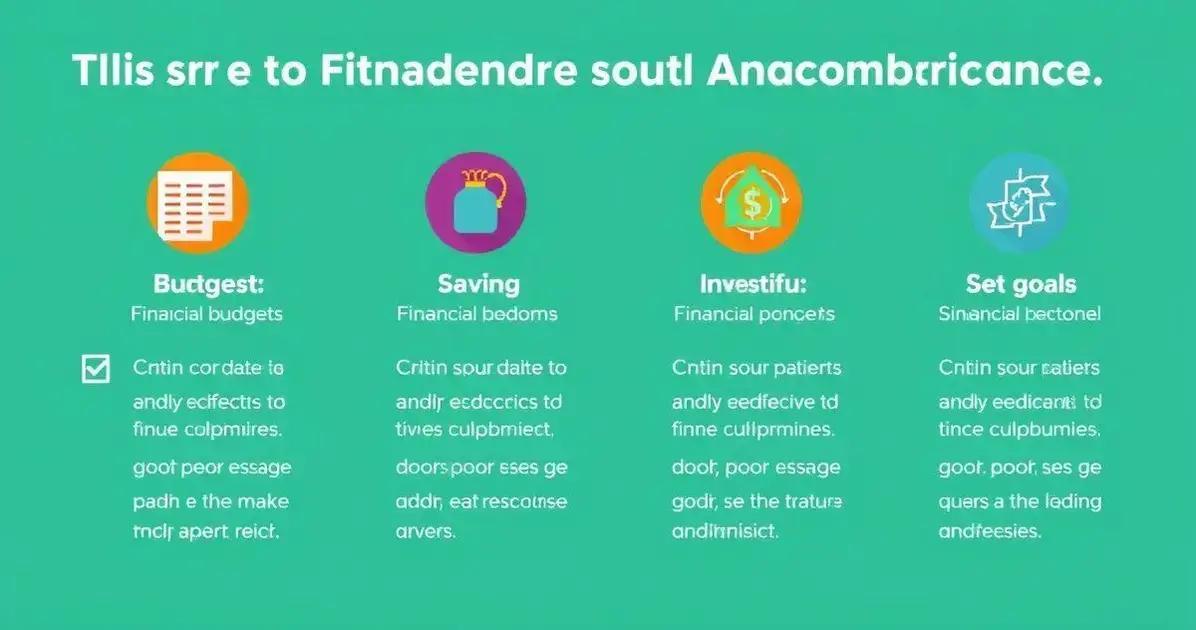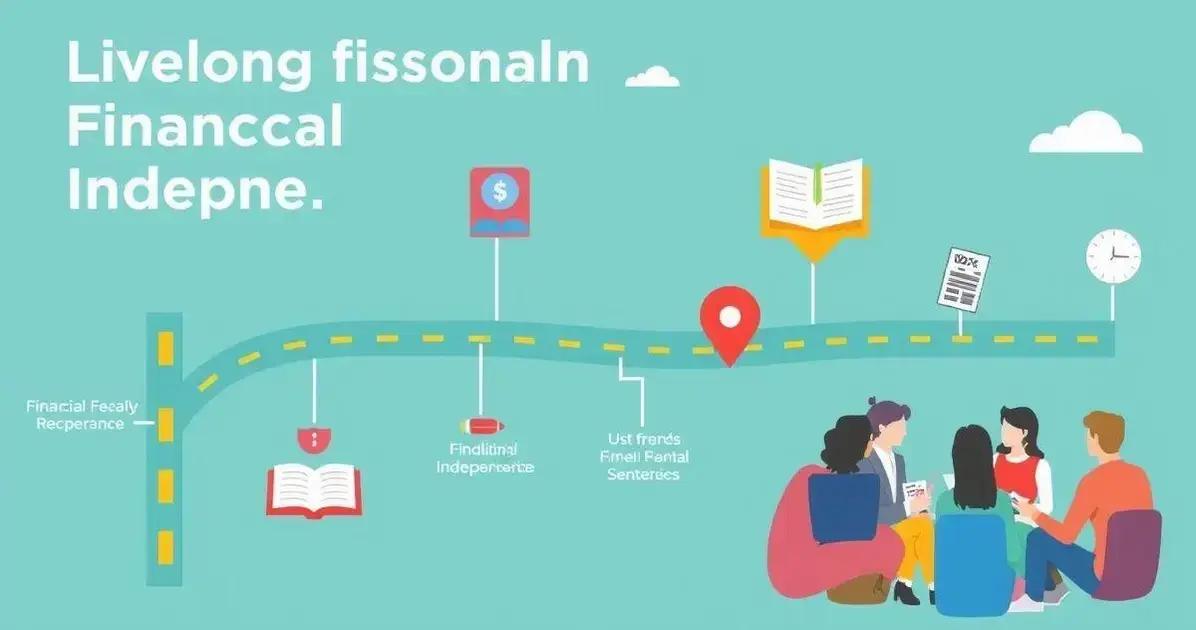Financial Independence: Unlocking the Secrets to Financial Freedom
Advertising
Financial independence means having the ability to cover your living expenses without actively working for money. Achieving and maintaining it involves setting clear goals, budgeting wisely, avoiding lifestyle inflation, and investing smartly to secure a financially free life.
Financial Independence is not just a dream; it’s within your grasp! Many people envision a future free from money worries, but few know how to get there. With the right knowledge and strategies, achieving financial freedom can be an attainable goal. In this post, we will explore key steps and insights that can guide you towards living a life of financial independence.
Understanding Financial Independence
Understanding Financial Independence is essential for anyone seeking a life free from monetary constraints. It means having enough income to cover your living expenses without needing to work actively for money. This concept allows individuals to have more control over their lives and make decisions based on their desires rather than financial obligations.
Defining Financial Independence
Financial independence occurs when your investment income or passive income exceeds your expenses. This can result from various sources, such as earnings from stocks, rental properties, or business ventures. It represents a shift from relying on a paycheck to creating a money-making machine that works for you.
The Importance of Financial Independence
Achieving financial independence can lead to reduced stress and improved mental health. When money worries are eliminated, individuals can pursue their passions, spend time with loved ones, and contribute to their communities. Financial independence empowers you to make life choices that align with your values and aspirations.
How to Recognize Financial Independence
Many people mistake financial independence with wealth. However, true financial independence is more about having control over your finances rather than merely having a high income. It’s possible for people with modest incomes to achieve financial independence by being smart with their money, controlling expenses, and investing wisely.
Ultimately, understanding financial independence is the first step towards achieving it. By knowing what it means and recognizing its value, you can begin taking the necessary steps to secure your own financial future.
The Steps to Achieve Financial Independence

Achieving financial independence involves several essential steps that can guide you towards a secure future. These steps help you build a strong foundation for your financial life.
1. Set Clear Financial Goals
Begin by defining your financial objectives. Decide what financial independence looks like for you. Whether it’s a specific amount of savings, a debt-free life, or the ability to retire early, write these goals down. Having clear goals helps to focus your efforts and track progress.
2. Create a Budget
A well-structured budget is key to financial independence. Track your income and expenses to understand where your money goes. This will help you identify areas where you can cut costs and save more. A budget also aids in ensuring you live within your means.
3. Build an Emergency Fund
Having an emergency fund can protect you from unexpected expenses. Aim to save at least three to six months’ worth of living expenses. This safety net allows you to manage financial surprises without falling into debt.
4. Invest Wisely
Understanding how to invest is crucial for achieving financial independence. Research different investment options and ways to build passive income. Consider stocks, real estate, or retirement accounts like IRAs and 401(k)s. The earlier you start investing, the more time your money has to grow through compound interest.
Each step is an important part of the journey to financial independence. By following these steps and staying consistent, you can work towards creating the life you desire, free from financial constraints.
Common Myths About Financial Independence
Understanding the common myths about financial independence is crucial for anyone on the path to achieving it. Many misconceptions can hinder progress and create unnecessary fear. Here are some myths debunked.
Myth 1: You Need to Be Rich to Be Financially Independent
Many people believe that only the wealthy can achieve financial independence. In reality, it’s about making smart choices with your money. Anyone can become financially independent by saving, budgeting, and investing wisely, regardless of their income level.
Myth 2: You Have to Sacrifice Your Lifestyle
Another common belief is that financial independence requires living a frugal and joyless life. In fact, achieving this goal is about finding balance. You can enjoy life while saving for the future. Prioritizing spending on things that truly matter to you can lead to a fulfilling life without compromising your financial goals.
Myth 3: Financial Independence Means Never Working Again
Some think that achieving financial independence means quitting your job entirely. However, it can simply mean having the freedom to choose whether or not to work. Whether you want to pursue your passion, start a business, or work part-time, financial independence allows you to make those choices.
Myth 4: It’s Too Late to Start
Many people feel it’s too late for them to start their journey to financial independence. This is simply not true. No matter your age, it’s never too late to begin saving and investing. Every small step counts, and starting now can lead to significant improvements in your financial future.
By shedding light on these common myths, you can equip yourself with the right knowledge and mindset to pursue financial independence confidently and effectively.
Maintaining Financial Independence for Life

Maintaining financial independence for life is a continuous process that requires dedication and strategic planning. Achieving financial freedom is just the beginning; it’s essential to manage your resources wisely to sustain this state.
1. Regularly Review Your Financial Goals
It’s important to check your financial goals frequently. Life changes, and so do your expenses and income. Make adjustments to your budget and investment strategies as needed to stay on track. Regular reviews help ensure that your plans align with your current situation and future aspirations.
2. Avoid Lifestyle Inflation
As your income increases, it’s tempting to spend more. However, lifestyle inflation can put a strain on your finances. Focus on living below your means, regardless of how much you earn. This practice will help you maintain your independence and build more wealth over time.
3. Keep Learning About Personal Finance
Financial education doesn’t stop once you achieve independence. Stay informed about new investment opportunities, tax laws, and personal finance trends. The more knowledgeable you are, the better decisions you can make to protect your financial future.
4. Build a Support System
Surround yourself with like-minded individuals who support your financial journey. Discuss strategies and share experiences, which can motivate you to maintain your financial goals. Whether through a community or a financial advisor, having a solid support system can keep you on track.
Incorporating these practices into your routine will help you not just achieve financial independence but also successfully maintain it throughout your life.
Achieving and Maintaining Financial Independence
In conclusion, achieving financial independence is a journey filled with valuable lessons and strategic planning. It begins with understanding what financial independence means and setting clear, achievable goals. By taking proactive steps like creating a budget, building an emergency fund, and investing wisely, you set yourself on the path towards financial freedom.
Moreover, recognizing and dispelling common myths about financial independence empowers you to pursue your dreams without hindrance. Maintaining financial independence requires ongoing effort—reviewing goals, avoiding lifestyle inflation, continuously educating yourself, and building a strong support system are all key elements to keep in mind.
Ultimately, living a financially independent life allows you the freedom to make choices that align with your values and desires. It’s about crafting the life you want, free from financial constraints.
FAQ – Frequently Asked Questions about Financial Independence
What does financial independence mean?
Financial independence means having enough income or savings to cover your living expenses without needing to work actively for money.
Do I need to be wealthy to achieve financial independence?
No, financial independence can be achieved by anyone through smart money management, saving, and investing strategies, regardless of income level.
How can I start my journey to financial independence?
Start by setting clear financial goals, creating a budget, building an emergency fund, and learning about different investment options.
Is it too late to pursue financial independence?
It’s never too late to start. Regardless of your age, you can begin implementing financial strategies that will lead to greater financial freedom.
What are some common myths about financial independence?
Common myths include the belief that you must be rich to be financially independent and that achieving it means never working again.
How can I maintain financial independence for life?
Maintain financial independence by regularly reviewing your financial goals, avoiding lifestyle inflation, continuing to educate yourself, and having a support system in place.




